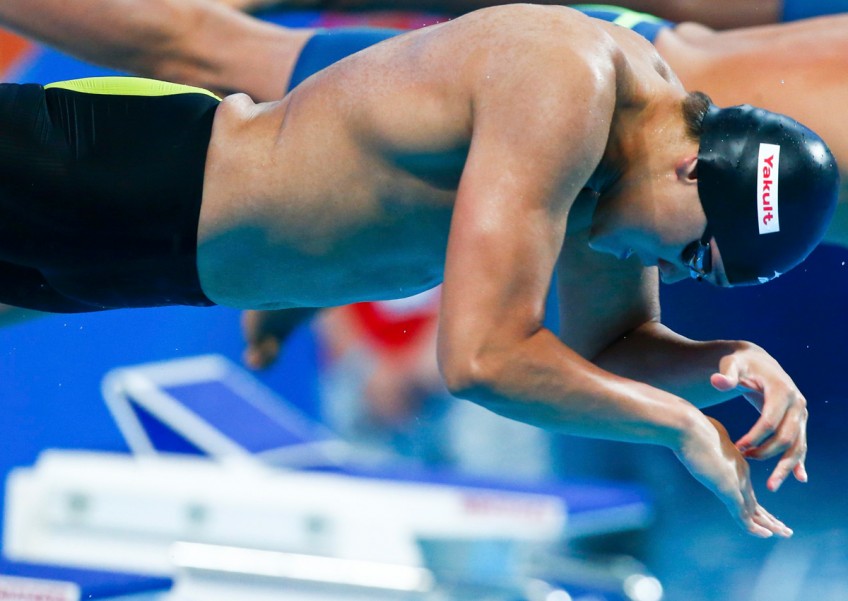Joseph Schooling's quest for perfection


It was Aug 8, the day of the 100m butterfly final, his last race at the Fina World Championships and that was when Joseph Schooling came closest to the perfect swim he had been chasing in his career.
But the most extraordinary day of his 20 years had begun just like any other day.
Said Schooling: "I didn't think much about the upcoming race. I just treated it like another day... it was pretty much normal for me, nothing too extraordinary."
At around 6.13pm, wearing plain black jammers, he stepped on the pool deck at the Kazan Arena in Russia. Back in Singapore, people were draped in anticipation even though it was nearly midnight.
It had seemed that the odds were stacked heavily against Schooling.
He had been shunted out wide in Lane One because he qualified seventh overall. And his 1.84m frame was up against a strong field whose average height was 1.89m.
But back-to-the-wall suits Schooling, 20, fine. When he was younger, his coach at the Singapore Island Country Club used to make him start a race when his peers were already at the halfway mark.
It annoyed the competitor in him no end, but it meant he learnt how to fight to win.
Athletes are in the business of giving proof - proof of speed, proof of improvement - and Schooling has been proving he is the real deal: First Commonwealth Games swimming medal for Singapore, first Singaporean male swimmer to win an Asian Games gold in 32 years.
Aug 8 was another test, and yet not like any other exam he had passed - because it was the World Championships, one year before the Olympics.
There was no better time to go fast, and he did. With a reaction of 0.60sec, Schooling was quickest off the blocks.
But the key was translating that speed in the water, because being fast in the air is only half the battle.
His first 50m was, in his own words, "great".
He touched the wall first at 23.53.
A day later on Aug 9, Michael Phelps swam the year's fastest 100m fly, and his split was 24.10.
"I had an easy speed going out," said Schooling, who will be in town for this week's Fina World Junior Swimming Championships.
"I got most things right. I knew I was ahead and I thought, 'There was no reason why I can't bring it back'."
At the turn, he executed his famed underwater kicks, which his University of Texas coach Eddie Reese once likened to a dolphin's.
At the SEA Games, it was usually the point where he started to pull away. But not that day.
Chad le Clos, who was 0.19 slower at the turn, caught up. They were neck-and neck, with 25m left.
In hindsight, Schooling said: "My turn could be better and my kicks were kind of weak."
Eventually, le Clos won in 50.56 while Hungary's Laszlo Cseh took silver in 50.87. Schooling finished third in 50.96, an Asian record, a first medal for Singapore at the biennial meet, and the fifth-fastest time recorded in a textile suit.
It was his most perfect swim yet but he knows a good first 50m is nothing in a 100m race.
His back 50m was 27.43.
Le Clos' second lap was 26.84 and Cseh's 27.11. Phelps' was, well, Phelps-like at 26.35.
"It all boils down to strategy. I just need to pace myself well," said Schooling. "Obviously, le Clos has more experience at this level than me but the most important thing is next year.
"I'm not at my prime yet and I have loads of room to improve."
In Kazan, Schooling opted to get out hard but needed more power to finish more strongly. That means bench-pressing more than his current load of 95kg, and deadlifting more than 130kg he is used to now.
According to him, the next seven months of fine-tuning his techniques and pumping iron will make all the difference at the Rio Olympics next year.
"Swimming is all about the little things, a few tenths of a second is a lot of difference at this stage, and I have to take all these little steps on my way to my ultimate goal of winning an Olympic medal," he said.
"But I like the challenge. At this level, it's more mental than physical. I'm a good racer because one, I hate to lose, I just don't like it, and two, racing is the thing about swimming that excites me."
In Rio, he is swimming only the 100m and 200m fly because, in his own words, he is "not a young swimmer anymore but a world-class one trying to win".
From now till then, training is going to hurt. But maybe that is what it takes to win.
When Muhammad Ali was asked how many sit-ups he did, the boxer responded: "I only start counting when it starts hurting because they're the only ones that count."
And, as Schooling would say, losing probably hurts him more.
siangyee@sph.com.sg

This article was first published on August 23, 2015.
Get a copy of The Straits Times or go to straitstimes.com for more stories.